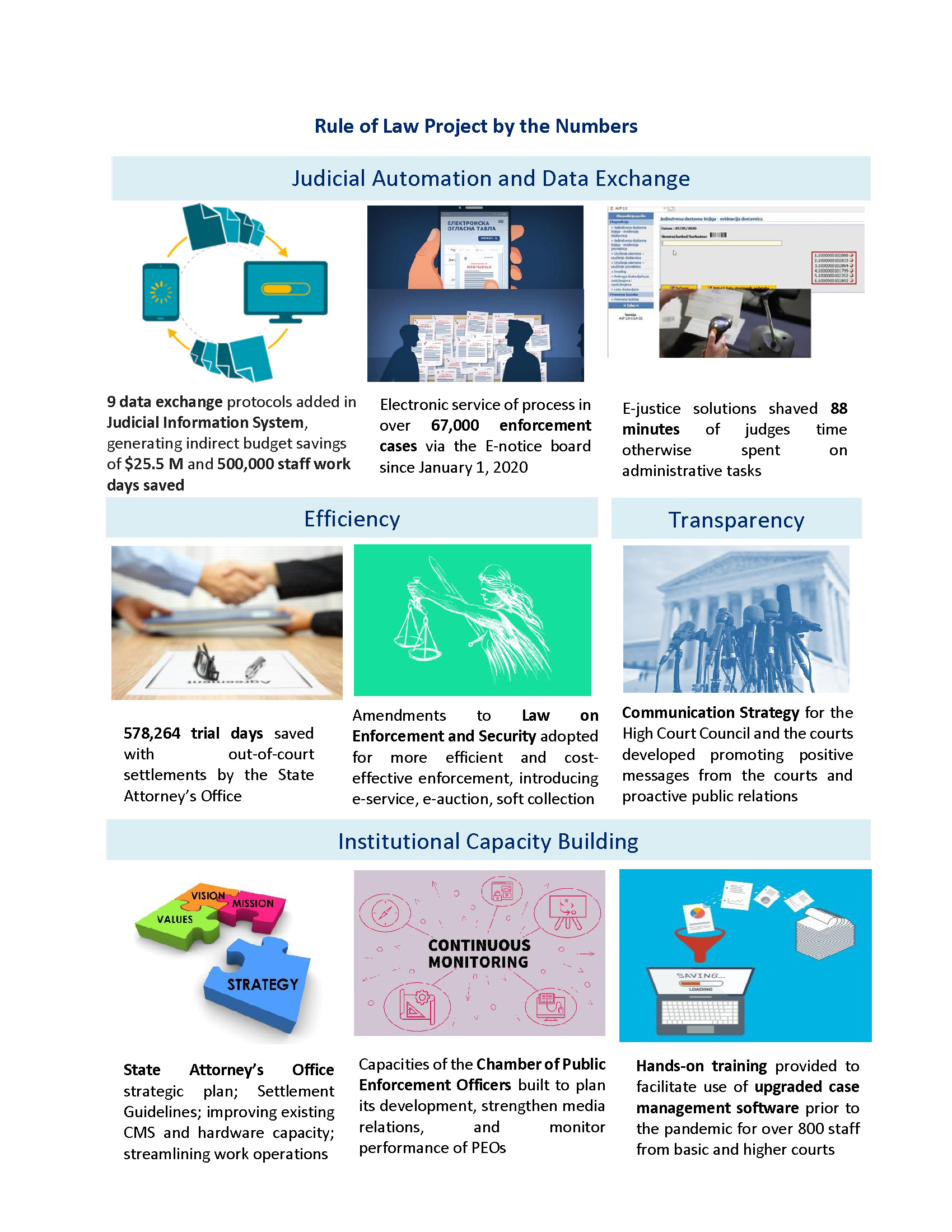
DPI was the prime implementer of the Rule of Law Project in Serbia (ROLPS), a four and a half year, $10.5 million initiative which enhanced the timely delivery of justice for Serbian citizens. ROLPS worked with the courts and the Ministry of Justice to promote the strategic advancement of Serbia’s judicial reform process, increase judicial efficiency, promote access to justice through non-judicial services (public enforcement officers), and build capacity of institutions in the judiciary outside of the court system (State Attorney’s Office).
The flexibility to respond to emerging issues in the ever-evolving Serbian justice system was a critical feature of the Project. DPI demonstrated ability to deliver complex reforms in an environment with multiple donors competing for attention of the Serbian government where donor coordination and agreements are difficult to achieve. DPI was also able to consistently link project achievements with EU accession requirements, fielding experts that were knowledgeable about and provided an added value for the EU accession process in the judiciary.
With a consensus-based approach to decision-making and full stakeholder involvement across the board, ROLPS achieved the following key outcomes:
a) working with the Ministry of Justice and the courts to continue the strategic advancement of Serbia’s judicial reform process, including drafting the new 2020-2025 Judicial Development Strategy prioritizing strengthened judicial independence, prosecutorial autonomy, and the integrity, quality, and efficiency of the judicial system, along with increasing the level of public trust;
b) implementing a range of initiatives to support judicial efficiency (improving court operations, and reducing delays in court proceedings), transparency, and strengthening the role and career path of judicial assistants:
- Electronic data exchange related to parties to court cases between the judiciary, legal professions, and other state institutions enabled through the Judicial Information System has eliminated the need for all paper-based requests, and to date has saved more than USD 25.5 million in budget costs, including nearly 500,000 workdays of administrative staff time, and eliminating the need for 23 million paper documents, rendering this both a user and environmentally friendly tool.
- E-justice solutions implemented in Serbian basic and higher courts render the completion of everyday administrative tasks (service of process and court fee processing) more than 55% faster than before. This has eliminated at least 88 minutes a day that judges previously spent on administrative tasks, as well as saving more than 3,133 court staff workdays since the solutions were introduced. The innovations provide judges more time to handle substantive legal matters and make court procedures more efficient.
- A communications strategy with an implementation plan for the High Court Council and courts was developed, as well as a comprehensive practical public relations guide for courts on all aspects of their work pertaining to communications with media and citizens, all aimed at improving the public understanding and perception of the judiciary.
c) supporting the ongoing improvement of the system for enforcement of judgments, ensuring the timeliness, predictability and integrity of enforcement actions:
- Adoption of Amendments to the Law on Enforcement and Security – drafted together with stakeholders led by the Ministry of Justice – is contributing to fairer, more efficient, and less costly enforcement, with strengthened measures in place to protect the human and economic rights of vulnerable citizens. Amendments enabled the introduction of an electronic notice board for the enforcement procedure - an online tool helping courts and public enforcement officers post notices more easily, as well as enabling citizens to check through a simple web interface whether they have been served any document in the enforcement procedure.
- The amendments also introduced an electronic auction service (e-Auction), which brings a new level of transparency and accountability to the sale of qualified movable and immovable property. Over 26,000 e-Auctions were held in its first year, with an average increase of 5% in the amount of winning bids compared to previous years.
d) strengthening institutional capacities of the State Attorney’s Office to improve performance and reduce time and cost associated with cases brought against the State:
- Streamlined settlement guidelines/procedures developed and implemented in cooperation with the relevant judicial institutions in cases concerning the breach of the right to trial within a reasonable time have resulted in 4,176 finalized settlements since the guidelines were adopted in July 2018, saving 578,264 trial days and USD 465,220 in court costs through the end of 2021, cutting the time and costs of these high-volume repetitive cases by two thirds.
- The upgrade and institution-wide introduction of a case management system (LURIS) for the State Attorney’s Office allowed generation of accurate statistical and performance reports for the first time. This assists the institution with strategic resource and operational planning, which is now fully evidence-based.
- Digitalization and modernization of the operations of the State Attorney's Office was also accompanied by work on provdiding high-quality substantive training program for its staff, and developing a comprehensive Strategic Plan which laid out both the mid and long-term goals for further institutional transformation.
ROLPS also implemented a grants program to strengthen civil society’s role in the ROL reform process.
For more information please visit the project Facebook page
Previous Work in Serbia
DPI’s ROLPS involvement also comes in the wake of our previous work, carried under the USAID Judicial Reform and Government Accountability Project (JRGA). The main task of this project (May 2011 – October 2016, $21.8M) was assisting the Government of Serbia to make the administration of justice more efficient, transparent and responsive to the needs of their users, and to increase public awareness about the improvements. Operating as a subcontractor to National Center for State Courts (NCSC), DPI was responsible for coordinating assistance, developing uniform best practices for expansion into multiple courts, and promoting the policy-making changes necessary to improve operations of the courts. DPI supported a Model Courts Program for both the Administrative Court and the Misdemeanor courts to strengthen court leadership and management, train judges and court staff to become better managers, and implement key reforms in their courts.
